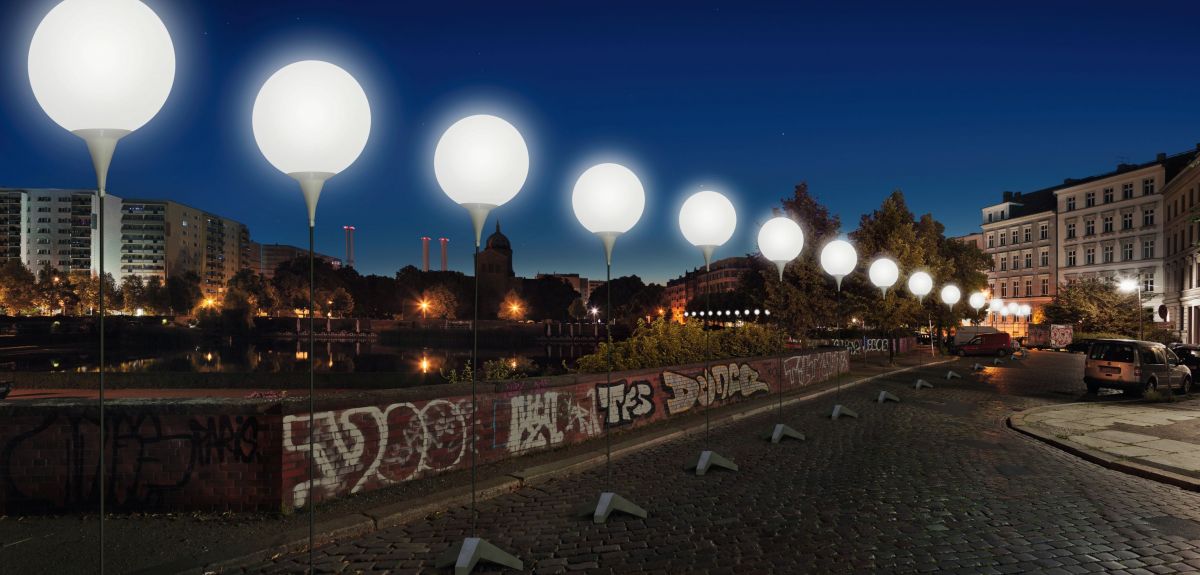
Kulturprojekte Berlin_WHITEvoid / Christopher Bauder, Photo: Daniel Büche
Berlin Wall's 25th anniversary event masks a divided Germany
Sunday 9 November was the 25th anniversary of the fall of the Berlin Wall. The event was marked by thousands of illuminated balloons installed along the former course of the wall. On Sunday evening, the balloons were released into the sky.
'It's a significant anniversary because it means a generation has now come to adulthood with no memory of living under the GDR (East Germany),’ says Karen Leeder, Professor of Modern German Literature in Oxford’s Faculty of Medieval and Modern Languages.
One might expect that people’s connection with the GDR would be falling as time passes, but Professor Leeder says more young people have connected with the culture of the GDR in recent years. She says: 'Nostalgia for the GDR is becoming more prevalent.
'GDR-branded goods such as Spreewald gherkins are popular and young people have re-established the Jugendweihe celebrations (a secular coming of age ceremony practised by 14 year olds), which were common under the GDR, to mark the end of their exams. Young writers who were children when the Wall came down are writing books which draw on their connection to the GDR.
'This is also reflected in politics. Die Linke, the left-wing party which descends from the former socialist unity party under the GDR, received 30% of the vote in Berlin in the last election (and 45% in the Eastern part) including a strong youth vote. At demonstrations you see a curious combination of the old guard who lived under the GDR and young people who were born in the 90s.'
Professor Leeder says disaffection with modern Germany is also increasing among older people who lived in East Berlin. 'Every so often there are questionnaires in which people are asked if they preferred life under the GDR and a large percentage still say yes,' she says. 'A lot of people continue to live a segregated life, staying in their own areas and rarely venturing into the west of the city.'
Professor Leeder says this increasing disaffection is partly due to the struggles of former-GDR areas in recent decades, which have suffered from high unemployment, low household income and a 'brain drain' of young qualified people moving to the west. But she argues that a key reason is that the reality of life under the GDR is being written out of the official narrative of post-war Germany.
'There is a divide between this local and regional connection to the GDR on the one hand, and the official narrative of modern Germany on the other,' says Professor Leeder. 'Germany and its political institutions present themselves today as having totally obliterated the GDR.
'The Wall is gone and the buildings are gone. Last weekend’s ceremony featured illuminated balloons along the course of the Wall to demonstrate that Germany has left the dark and come into the light.
'There were of course terrible things about the GDR but lots of people grew up, raised families and spent half of their lives in East Germany and they feel that the state does not recognise this experience as legitimate. They have had their history packaged, commodified and rendered back to them.
People from the former west run the GDR museums and encourage tourists to buy pieces of the Wall, Soviet-style hats and Ampelman figures which were used on traffic lights in East Berlin. So it is no surprise that there is a divide in the politics and culture of Germany.'
Given Germany's relative economic strength and political clout in Europe, this diagnosis might surprise some people. Professor Leeder explains: 'Hosting the World Cup in 2006 allowed Germany the opportunity to find a way to be nationalistic without seeming aggressive, and the country has developed a much more dominant role in Europe.
'But while the nation has become outwardly more confident, inwardly it is still very much coming to terms with its split identity. With the drive to present itself as a united, central political player, there has been a strong urge to gloss over a lot of the ambiguities of modern Germany.'
Professor Leeder says this approach is not the way to unite Germany. She says: 'I am currently writing a book called ‘Spectres of the GDR’ and one of the fascinating things is that since 1990, ghosts and spectres from Germany’s past have become very prevalent in art, film, literature and photography.
'As the past is repressed, it comes back in various forms as a threat or a disturbance. Germany needs to address the reality of its history before it can lay these ghosts to rest.'
Spectres of the GDR will be published by Duke University Press in 2015.